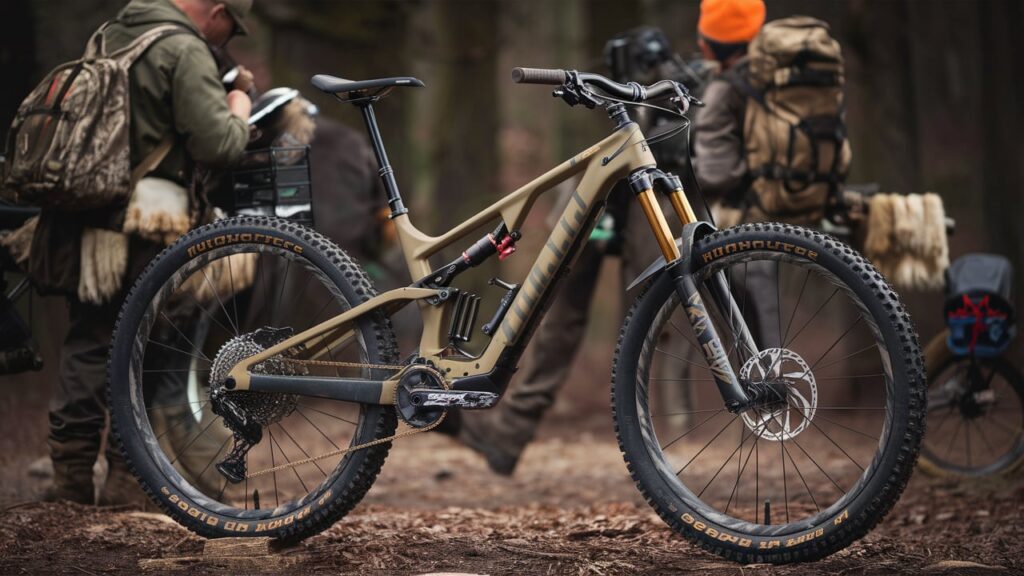Exploring rugged terrain and off-grid hunting trips can be thrilling. But managing battery life in such conditions is crucial.
Range optimization is vital for ensuring your devices last in remote areas. Proper battery management can make or break your adventure. It keeps your devices running, whether you’re navigating unknown paths or waiting for the perfect hunting moment. Understanding how to optimize battery life can enhance your experience, ensuring safety and convenience.
Let’s dive into the essentials of battery management, so your off-grid trips are worry-free and enjoyable.
Introduction To Range Optimization
Range optimization focuses on efficient battery management for rugged terrains and off-grid hunting trips. Maximize battery life to ensure reliable power in challenging environments.
When venturing into rugged terrains or embarking on off-grid hunting trips, battery management becomes crucial. Ensuring your gear remains powered can make or break your adventure. Range optimization focuses on maximizing the efficiency and lifespan of your batteries. This is essential for maintaining reliable performance in challenging environments.
Importance In Rugged Terrain
Rugged terrains often present harsh conditions. These conditions can drain your battery faster. Cold temperatures, uneven surfaces, and constant movement all affect battery life. Proper range optimization ensures your equipment functions effectively. It helps you avoid unexpected power failures. This is crucial for safety and success in tough environments.
Relevance For Off-grid Hunting Trips
During off-grid hunting trips, staying powered is vital. You rely heavily on GPS, communication devices, and other gear. Without proper battery management, you risk being stranded. Range optimization ensures your devices last longer. This allows you to focus on the hunt without worrying about power. It enhances your overall experience and safety on the trip.
“`
Battery Basics
Optimize battery range for rugged terrain and off-grid hunting trips. Smart management ensures longer power life in tough conditions. Keep devices running reliably.
Understanding battery basics is crucial for off-grid hunting trips. Batteries power your equipment and keep you safe. Knowing different battery types and their capacities can help you make smart choices.
Types Of Batteries
Several types of batteries are available. Each has its own advantages and disadvantages. Lead-acid batteries are common and affordable. They are also heavy and require maintenance. Lithium-ion batteries are lighter and last longer. They are more expensive but have a higher energy density. Nickel-metal hydride batteries offer a middle ground. They are lighter than lead-acid and less expensive than lithium-ion.
Battery Capacity
Battery capacity is measured in milliampere-hours (mAh) or watt-hours (Wh). Higher capacity means longer usage time. For rugged terrain, choose batteries with high capacity. They will last longer and perform better in tough conditions. Always check the capacity before buying a battery. It ensures you have enough power for your trip.
“`
Challenges In Rugged Terrain
Optimizing battery range in rugged terrain presents challenges. Managing power for off-grid hunting trips demands efficient battery use.
Navigating rugged terrain on off-grid hunting trips presents unique challenges for battery management. Rough landscapes and unpredictable conditions can strain your equipment and test your preparedness. Understanding these challenges can help you better manage your battery life, ensuring your devices stay powered through your adventure.
Temperature Extremes
Temperature fluctuations in rugged terrains can be severe. Batteries tend to drain faster in extreme cold. I once experienced this while hunting in the mountains; my GPS died within hours because the cold sapped its battery life.
To combat this, you can insulate your devices. Keeping them close to your body or using insulated pouches can help maintain a stable temperature.
In hot conditions, batteries can overheat, reducing their efficiency. Shade your devices and avoid leaving them in direct sunlight. Simple steps like these can extend your battery life considerably.
Physical Impacts
Rugged terrains mean your gear is constantly subjected to physical impacts. Drops, shakes, and vibrations can damage batteries and their connections.
I remember a trip where my flashlight stopped working after a fall. It turned out that the battery had dislodged. Securing your batteries with protective casings can prevent such mishaps.
Using shock-absorbent materials in your gear can also minimize impact. Ensure your equipment is securely fastened and well-cushioned.
Have you ever had a device fail during a critical moment? Reflect on how better battery management could have helped. These practical steps can ensure your devices endure the rigors of rugged terrain, keeping you safe and connected.

Battery Management Techniques
Efficient battery management can extend your trip and ensure safety. Especially in rugged terrain and off-grid hunting trips. It’s important to use smart techniques. This ensures your equipment stays powered.
Monitoring Systems
Monitoring systems help you track battery levels. They alert you before batteries run low. This lets you plan your charging times better. Some systems provide real-time data. This can include temperature and voltage. These details help you maintain battery health.
Choose monitoring systems that match your gear. This ensures compatibility and accuracy. There are various options available. From basic alerts to detailed analytics.
Charging Methods
There are several charging methods for off-grid trips. Solar chargers are popular. They use the sun’s energy. This makes them sustainable. They are also portable and lightweight.
Portable battery packs are another option. They store energy for later use. You can charge them before your trip. Then, use them to recharge devices on the go.
Vehicle chargers can be useful too. They use your car’s battery. This method is efficient during long drives. It helps keep your gear charged without extra weight.
Mix and match charging methods. This gives you flexibility. It ensures you have a backup plan. Always have multiple options. This prepares you for any situation.
Maximizing Battery Life
Maximize battery life for rugged terrain and off-grid hunting trips with effective range optimization techniques. Manage power usage for longer adventures. Ensure devices last throughout the journey.
Maximizing Battery Life
When you’re out on rugged terrain or embarking on an off-grid hunting trip, maximizing battery life is crucial. You don’t want to be stranded with no power. Understanding proper usage practices and energy conservation can make your adventure smoother and safer.
Proper Usage Practices
Proper battery use starts with understanding how your equipment works. Always read the user manual to know the recommended battery type and usage guidelines. Ensure batteries are fully charged before heading out.
Avoid exposing batteries to extreme temperatures. Both heat and cold can reduce battery efficiency. Store them in insulated pockets or cases.
Also, rotate batteries. Using the same battery repeatedly can wear it down faster. Swap them out to ensure even usage and longer life.
Energy Conservation Tips
Be mindful of your energy consumption. Turn off devices when not in use. Simple actions like switching off a GPS when you’re at camp can save hours of battery life.
Use energy-saving modes on your devices. Many gadgets have settings to reduce power consumption. Enable these modes to extend battery life.
Consider solar chargers. They’re a great way to recharge batteries when you’re off the grid. A compact solar charger can fit in your backpack and provide extra power when you need it.
How do you manage battery life during your trips? Implementing these tips can make a big difference. Remember, a well-managed battery can be the difference between a successful trip and a challenging one.
Innovative Technologies
As you embark on rugged terrain and off-grid hunting trips, optimizing your battery management becomes crucial. Innovative technologies can make a significant difference in extending your range and ensuring your devices stay powered. Below, we delve into two essential technologies: solar charging and portable power banks.
Solar Charging
Solar charging harnesses the power of the sun to keep your devices powered. Imagine setting up camp after a long day of hunting and using solar panels to recharge your batteries. It’s a sustainable and reliable solution.
Solar panels come in various sizes and efficiencies. Some are compact and foldable, making them easy to carry in your backpack. Others are larger and can be set up at your base camp to charge multiple devices simultaneously.
What happens when it’s cloudy or rainy? Advanced solar panels can still generate power under low-light conditions. This ensures that you’re not stranded without power even when the weather isn’t cooperating.
Portable Power Banks
Portable power banks provide a quick and convenient way to recharge your devices. These compact devices store energy and can be a lifesaver when your batteries are running low.
High-capacity power banks can charge your smartphone multiple times and even power larger devices like laptops or GPS units. They are designed to be durable, often with rugged exteriors that can withstand harsh conditions.
Imagine trudging through tough terrain and knowing you have a reliable power source in your pocket. It’s reassuring and can make all the difference in ensuring your trip goes smoothly.
Have you ever been on an off-grid trip and found your devices running out of power? How did you manage? Exploring these innovative technologies could transform your future adventures.
Case Studies
Case studies offer valuable insights into real-world applications of range optimization in battery management. These stories highlight practical solutions for managing battery life during rugged terrain and off-grid hunting trips. Let’s dive into some successful hunting trips and the lessons learned from them.
Successful Hunting Trips
One hunter, John, ventured into dense forests for a week-long trip. He relied on a solar-charged battery pack. His strategy included conserving power by limiting device use during the day. He also used energy-efficient gear. This approach ensured his equipment lasted the entire trip.
Another case involves a group hunting in mountainous regions. They used portable wind turbines to recharge batteries. This method proved effective in windy conditions. The group maintained full power throughout their expedition.
Lessons Learned
These case studies reveal the importance of planning. Hunters learned to anticipate power needs and adapt their strategies. Using renewable energy sources like solar and wind proved essential. Efficient gear and mindful usage further extended battery life.
Through these experiences, hunters also realized the value of backup plans. Carrying extra batteries or alternative charging methods ensured they stayed powered. Adaptability and preparation emerged as key factors for successful off-grid hunting trips.
Future Trends
Imagine trekking through rugged terrain or embarking on an off-grid hunting trip without worrying about your battery running out. Advancements in battery technology are making this a reality. Let’s explore the future trends that will revolutionize your outdoor adventures.
Advancements In Battery Tech
Battery technology is evolving rapidly. Newer batteries offer longer life spans and faster charging times. This means you can spend more time exploring and less time waiting.
Solid-state batteries are gaining traction. They are safer, have higher energy density, and can operate in extreme temperatures. These features are perfect for rugged and off-grid environments.
Additionally, lithium-sulfur batteries show promise. They are lightweight and have a higher energy capacity than traditional lithium-ion batteries. Imagine carrying less weight while having more power at your disposal.
Potential Impact On Off-grid Adventures
These advancements have significant implications for off-grid adventures. Extended battery life ensures you can rely on your devices for navigation and communication without frequent recharges.
Faster charging means you can quickly top up your battery during short breaks. This is especially useful during long hunting trips where every minute counts.
Moreover, the ability to operate in extreme temperatures allows you to venture into harsh climates. Whether it’s freezing cold or scorching heat, your battery will keep up with your needs.
Imagine the peace of mind knowing your battery won’t fail you in critical moments. How would this change your approach to planning your next adventure?
As battery technology continues to evolve, the possibilities for off-grid and rugged terrain adventures are endless. Keep an eye on these trends and consider how they can enhance your future trips.
Frequently Asked Questions
Which Battery Is Most Suitable For Off-grid System Application?
Lithium-ion batteries are most suitable for off-grid system applications. They offer high efficiency, long lifespan, and low maintenance.
What Type Of Battery Is The Most Rugged Of Existing Battery Technologies?
Lithium Iron Phosphate (LiFePO4) batteries are the most rugged. They offer high durability, stability, and long life.
What Is The Best Battery For Cold Weather Off-grid?
The best battery for cold weather off-grid is a lithium iron phosphate (LiFePO4) battery. It offers excellent performance and reliability in low temperatures.
What Is Battery Energy Storage For Grid Stability?
Battery energy storage stabilizes the grid by storing excess energy and releasing it during high demand. It enhances reliability and efficiency.
Conclusion
Proper battery management is crucial for rugged terrains and off-grid hunting trips. Efficient power use ensures your devices work when needed most. Plan well to extend your battery life. Choose reliable equipment for tough conditions. Remember, preparation makes a significant difference.
Safe travels and happy hunting!








